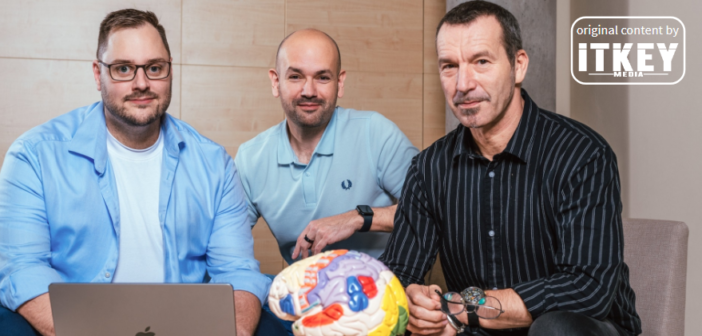- Prague-based digital health startup Elin.ai attracts EUR 600K of Pre-Seed investment
- The startup’s LLMs analyze a user’s online interactions and offer actionable insights, targeting GenZ
- With the new investment at hand, Elin.ai will launch publicly and start preparing for the Seed round
Czech AI-powered mental health assistant Elin.ai announced having raised EUR 600K of Pre-Seed funding this June. The investment comes from one of Czech Republic’s most proactive VC funds Presto Ventures (invested in Zerops this same month, for example), BD Partners, and angel investors.
Realizing the Rapid Widespread of Mental Health Issues
Dr Jan Romportl, Dr Petr Stanislav, and Dr Jiří Horáček (with joint expertise spanning from AI and cybernetics to psychiatry and neurology) started Elin.ai in 2023, following prolonged discussions on the mental health of the population and the possible application of AI to improve it. According to Dr Romportl, the co-founders have been discussing in-depth the worsening mental health already for about five years – beyond GenZ, for the whole population. These discussions were fueled by psychiatrists observing enormous levels of anxiety in people, which often lead to societally detrimental phenomena such as beliefs in conspiracy theories, antisocial behavior, mistrust in democratic institutions, polarization, violence, etc.
Eventually, it was decided to make Elin.ai specifically for GenZ. Reportedly, 30 to 40% of US and EU teenagers suffer from depression or chronic anxiety because of social media. At the same time, there’s a critical global shortage of psychiatric and psychotherapeutic care for children and youth. This is illustrated by a number of studies, including the recent extensive research by Prof. Jonathan Haidt.

Dr Jan Romportl, Co-Founder and CEO at Elin.ai
There is an opinion that such numbers are due to increased awareness and lower stigmatization of mental health issues, but Dr Romportl argues that the facts beg to differ.
‘The hard-data evidence really shows that the mental health of GenZ hase seriously worsened and that it’s not confounded by increased awareness. The main metrics are suicide rate and number of self-harm hospitalisations. Both skyrocketed especially for teen and pre-teen girls. Why these two metrics? Because suicide and hospitalisation cannot be explained (or dismissed) by claiming that the numbers go up just because of lower stigmatization of mental health topics among present-day young people as opposed to millennials and GenX,’ Dr Romportl explains.
‘Cognitive Antivirus’
So, the co-founders came up with the idea of an AI-driven ‘cognitive antivirus,’ and Dr Romportl would incubate this idea in his for quite some time.
‘And then one day, about 2 years ago, I was helping my 10 year old son program his own game in Scratch. When it was finished I asked him if he would share it freely with other people on Scratch forums. His answer was a definitive NO – that he was so afraid of trolls, online hate, and cyberbullying that he would never share online anything that he made. Because he saw that anything you create and share online just brings you fear from shaming,’ Dr Romportl recalls.
This became the trigger for the co-founders’ decision to start working on their cognitive antivirus specifically for GenZ first.
‘I am struck by the huge discrepancy between the number of parents who are afraid to let their kids play outside by themselves, even though they are naturally very well equipped to handle that – yet, at the same time, leave their children completely on their own in the online world where we actually have no evolutionarily adapted defense mechanisms at all. On top of that, both us and our kids are constantly bombarded by super-optimized algorithms that aim to maximize our screen time and click-through rate,’ Dr Romportl adds.
The startup was named after his 6-year-old daughter. ‘I really wish that before human Elin turns 10 years old and starts to be pulled by her peers into the online world, Elin.ai will already be an organic part of the online experience and ecosystem,’ Dr Romportl comments. Additionally, it is a short name that’s easy to pronounce in most languages.
Proprietary LLMs to Improve Online Experience and Behavior
Elin.ai’s cognitive antivirus is a mobile app that tracks the user’s online interactions and analyzes the content they consume and produce. Its long-term memory gradually learns about the user’s world and provides actionable advice on how to improve their personality model. More specifically, Elin.ai uses AI (Large Language Models) to deliver accurate and personalized psychological response to screenshots provided by Gen Z users. In the form of a chat, the app helps them understand and cope with the content by providing useful context, advice, or interventions to protect their mental wellbeing.

Přemysl Rubeš, Founder and Managing Partner at Presto Ventures
For a better understanding of GenZ and their problems, Elin.ai cooperates with a 5-member development team of talented 15-19-year-old students from a famous technical high school in Prague and the Wellbeing Center’s testers, user focus groups etc. The cooperation is realized through Elin.ai’s Discord Server called Gen Zen Space.
Elin’s AI and all the backend is developed in-house, as well as the prototype web app. The native iOS and Android MVP app frontend is outsourced to a software studio, but supervised by the startup’s visual designer and product designer. The app frontend communicates Elin’s proprietary backend with AI, and once the MVP native app is developed, Elin will take over the codebase.
According to Dr Romportl, Elin.ai’s LLM learns quite a lot as soon as in two weeks when using it daily for five minutes, depending on the quality of interactions: Some are more helpful for Elin to learn about the user than others. If the user connects social media accounts (which will be available starting this Autumn, beginning with Instagram, and adding Discord and Twitter later on) and is active there, Elin learns a lot immediately.
Importantly, Elin learns exclusively from the exact user’s data and doesn’t upload it to train any ‘general’ LLM. The learned information forms Elin’s long-term memory dedicated to this user only, and the user can delete it any time. In about six months, users who explicitly opt in can help train Elin’s LLMs with their data – but only in the Reinforcement Learning with Human Feedback, by providing feedback on whether a particular Elin’s interaction was helpful. The company assures that it doesn’t presuppose any personal data leakage across users.
Speaking of languages, Elin is only available in English for now. There are plans to introduce Czech and Ukrainian (the front-end developer is based in Kyiv) as soon as in August. Slovak is to follow soon after, and more European languages in the next 6-12 months.
Investments for Rolling Out
As of now, the Elin app is in the beta testing stage, tested by approximately 500 users.
Those interested in beta testing are welcome to sign up on the waitlist at elin.ai.
Presto Ventures’ founder and managing partner Přemysl Rubeš lists three reasons that make investing in Elin.ai is a very exceptional instance for his fund:
- It is a B2C user app category, in which Presto Ventures usually has no interest.
- Dr Jan Romportl, a renowned AI and deeptech expert, has been working with Presto Ventures for years. That’s why the investors had no second thoughts about the deal.
- Elin.ai is the only startup in Presto Ventures’ 60-strong portfolio that obtained funding in the idea stage.
Such is the fund’s confidence in Elin.ai’s founding team and their mission.

Ladislav Bartonicek, General Partner at BD Partners
‘The investment in Elin.ai stems from our commitment to leveraging technology for meaningful societal impact. We have worked with the team before and believe in their technology-driven approach that addresses the crucial need for mental health support among young social media users. We’re excited to be part of their journey,’ BD Partners’ general partner Ladislav Bartonicek states.
The main priority in view of the Pre-Seed round of investment is the public launch, scheduled for this Autumn. More specifically, Elin.ai can accelerate iterative product development, including both a visually appealing app and a powerful AI backend, and user validation, i.e. achieving excellent product-market fit with the target group. Once done, the startup can have a Seed round, introduce monetization, and start expanding.

Kostiantyn is a freelance writer from Crimea but based in Lviv. He loves writing about IT and high tech because those topics are always upbeat and he’s an inherent optimist!





